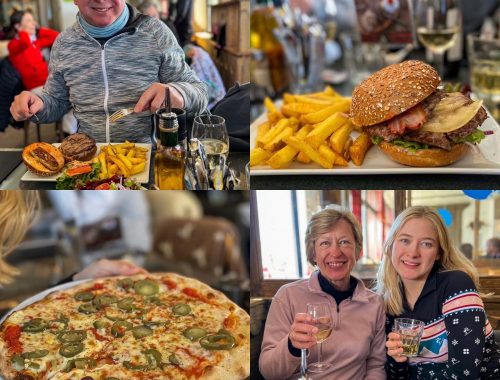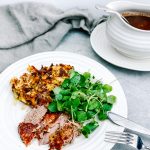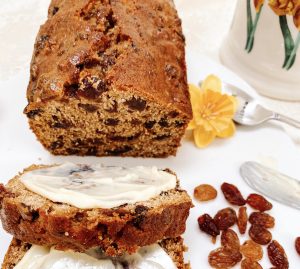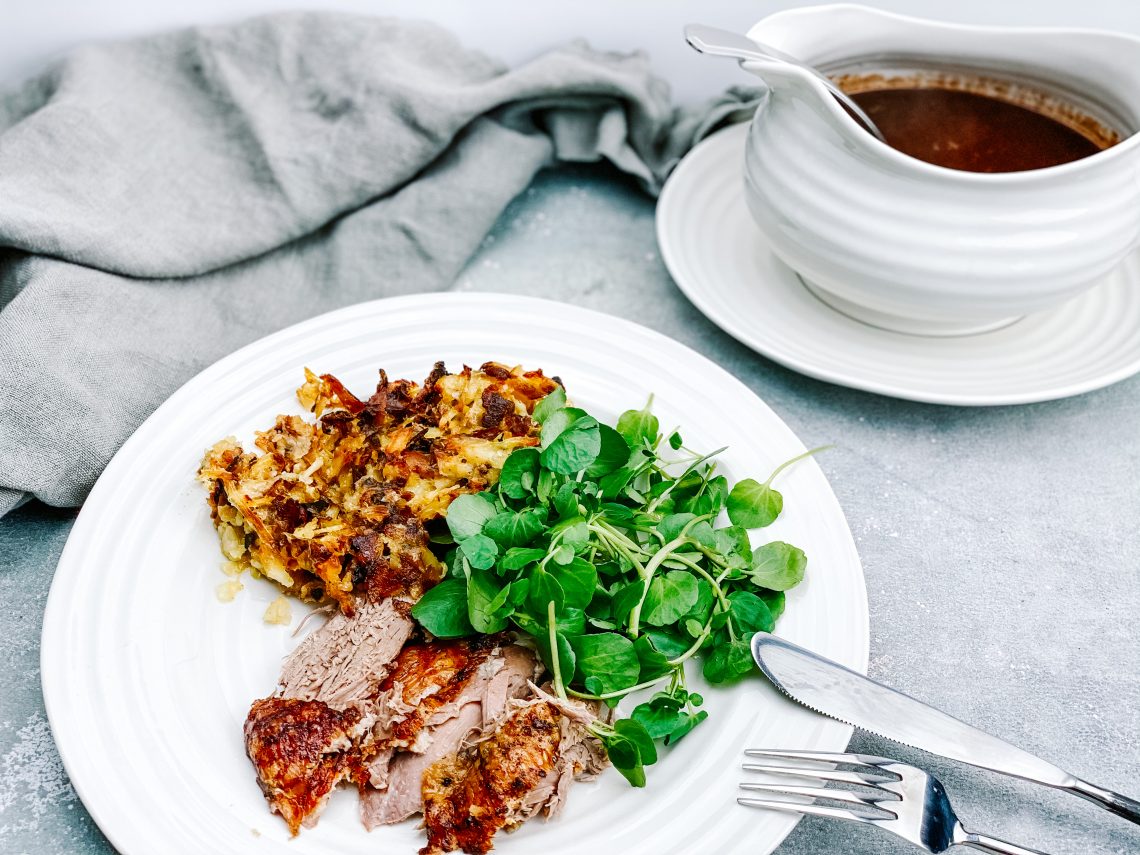
Whole Slow-Roast Duck with a Port, Ginger and Redcurrant Gravy
I love duck – pan-fried, grilled, roasted or confit/cured. Although classified as poultry, this tender, sweet meat is more akin to red meat than poultry and can be served rare or slow roasted, until it falls off the bone. This recipe calls for slow roasting in the oven and then making a silky, unctuous gravy from the pan juices, some reduced port, redcurrant jelly, ginger and a rich stock made from the giblets.
I served it with some Swiss Rösti and some watercress but it is also delicious with Roast Potatoes, Gratin Dauphinois, simple, creamy mashed potatoes, some Hasselback Potatoes or even some Oven-Baked Fries.
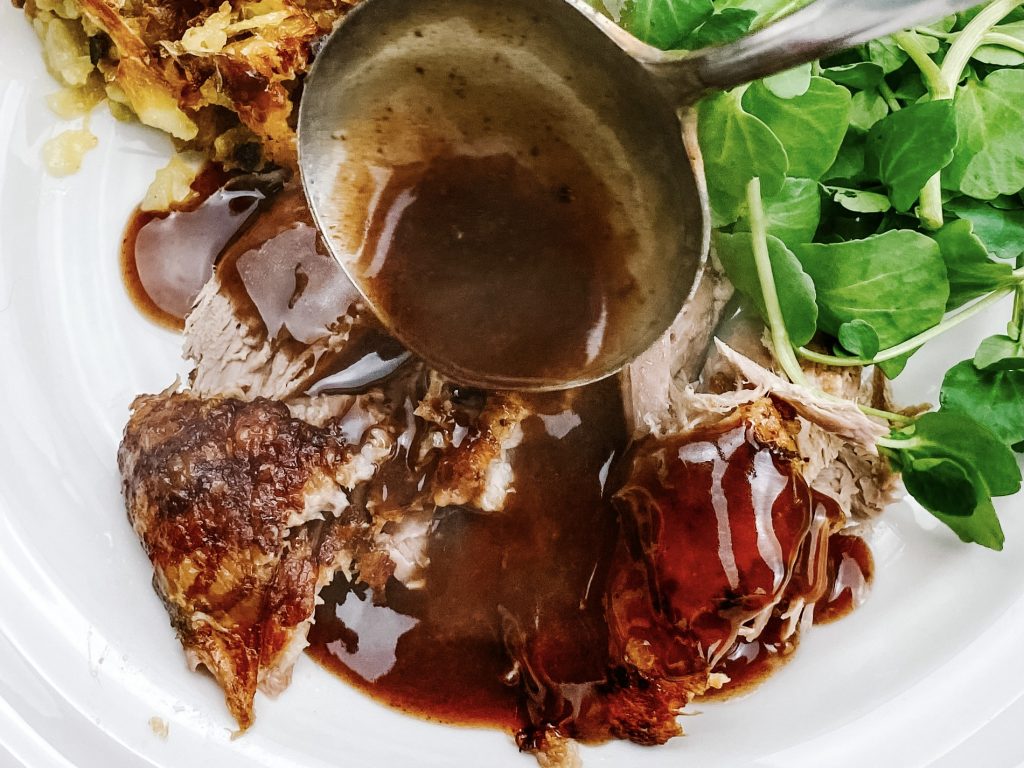
How to make Whole Slow – Roast Duck with a Port, Ginger and Redcurrant Gravy
Work out cooking time and collect together your ingredients, making sure you:
- allow time for the duck to come to room temperature before cooking,
- also allow time for resting the duck after it has been cooked.
Why should meat be cooked at room temperature?
When you cook any meat, the muscles will contract and tighten when heated. The colder the muscles the more they will contact and this means it is harder for the heat to distribute evenly when cooking. By letting the meat come to room temperature before you cook it, your meat will cook more evenly and you will end up with juicier meat. It can take between 30 – 60 minutes for your fridge cold meat to reach room temperature depending on its size and the room temperature.
You also need time to rest the meat after cooking:
As the muscles of the meat contract and tighten when cooked, the juices are forced toward the surface of the meat and some will evaporate. (Which is why overcooked meat is dry.) Allowing the meat to rest after you have removed the heat source, means the muscles will relax and the juices can re-distribute throughout the meat. If you cut it immediately, you are in danger of losing some of these juices and your duck may be dry and also lose the flavour in those gorgeous juices.
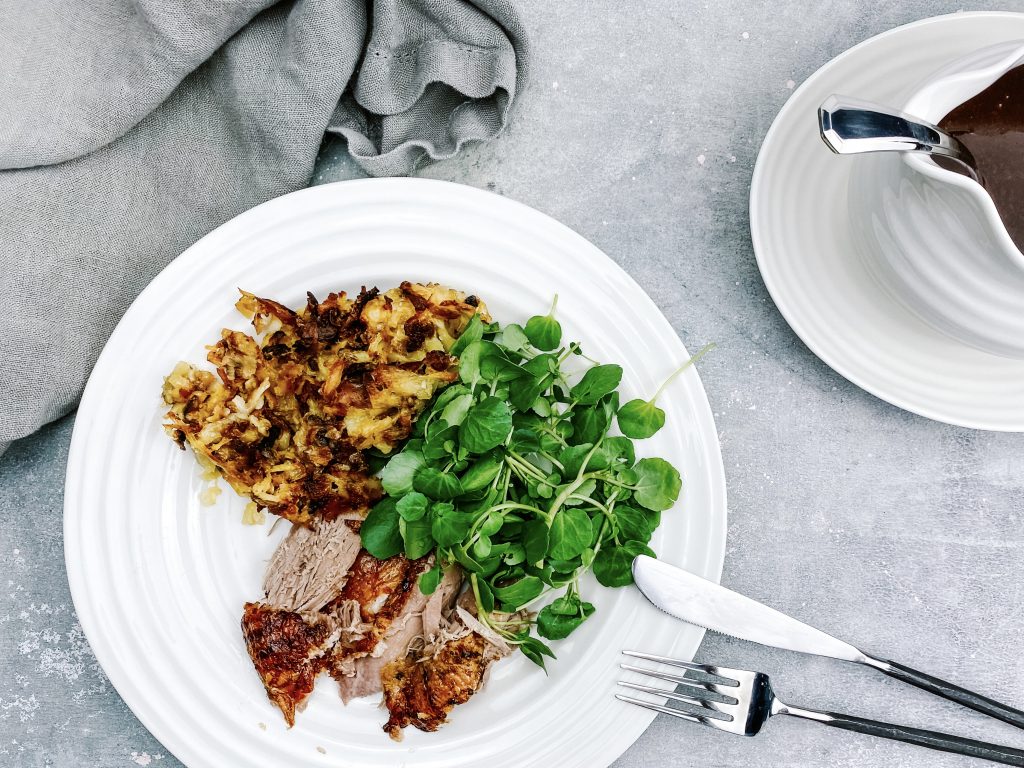
Cooking time:
The length of time a duck takes to cook will depend on both its size and also the temperature of the oven. This method is a slow method starting with a hot oven and then reducing the temperature for the most part:
- Preheat oven to Fan Oven 180°C/200°C/400°F/Gas 6. Cook at this temperature for the first 30 minutes
- Reduce to Fan Oven 150°C/170°C/325°F/Gas 3 for the remainder of the cooking.
- Work out your cooking time: this will be 30 minutes per 500g (or 10 mins per 165g) plus 30 minutes.
- For those working in imperial measures, 500g is 1.1 lbs and 165g is 5.8oz
- A 1.25kg duck –
- will take 30 minutes at the hotter temperature.
- plus, 1 hour and 15 minutes at the lower temperature – overall cooking time: 1 hour and 45 minutes.
- allow 15 minutes for the duck to rest.
- Total time – 2 hours.
- A 2.3kg duck –
- will take 30 minutes at the hotter temperature
- plus, 2 hours and 20 minutes at the lower temperature – overall cooking time: 2 hours and 50 minutes
- allow 15 minutes for the duck to rest.
- Total time – 3 hours and 05 minutes.
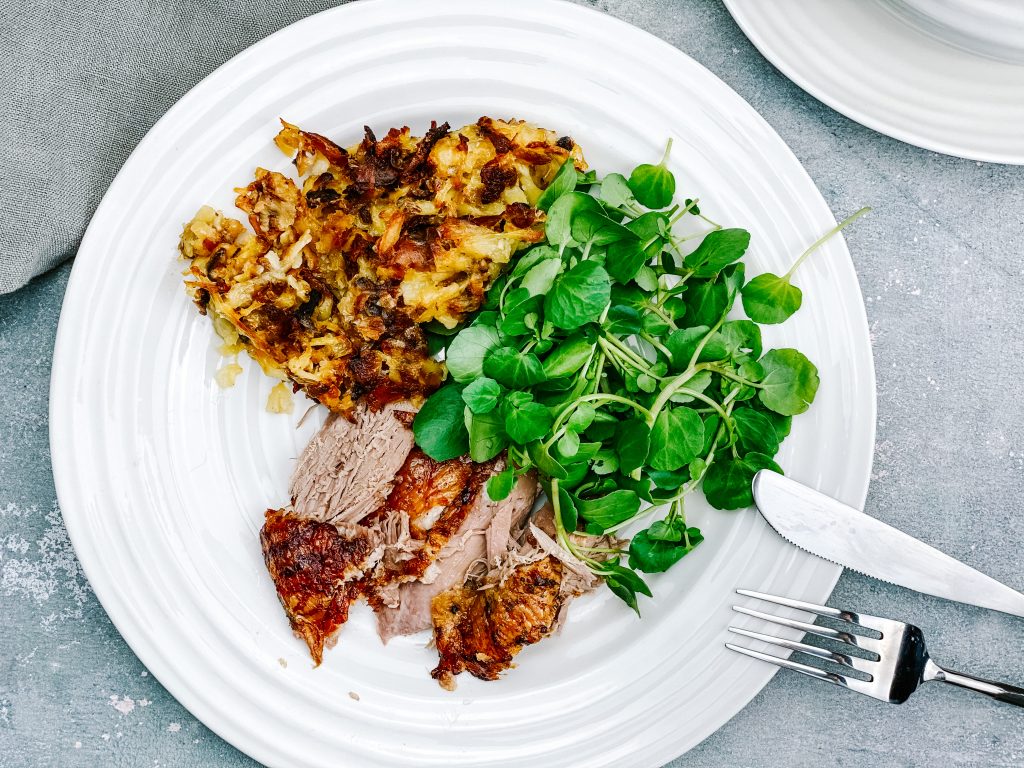
Ingredients:
Duck:
- whole duck
- sea salt
- freshly ground black pepper
- onion, peeled and quartered
- fresh thyme
- olive oil
Stock: (or use chicken or beef stock)
- duck giblets
- vegetables – such as onion, carrots, celery. I used ½ medium onion, 2 small carrots and some fresh thyme
- water
Gravy:
- onion, peeled and chopped
- garlic, peeled and squashed with the back of a knife
- carrot, washed and roughly chopped
- thinly sliced ginger – no need to peel
- fresh thyme
- bay leaf
- port
- plain/all-purpose flour
- duck or chicken stock
- redcurrant jelly
- fine salt
- freshly ground black pepper
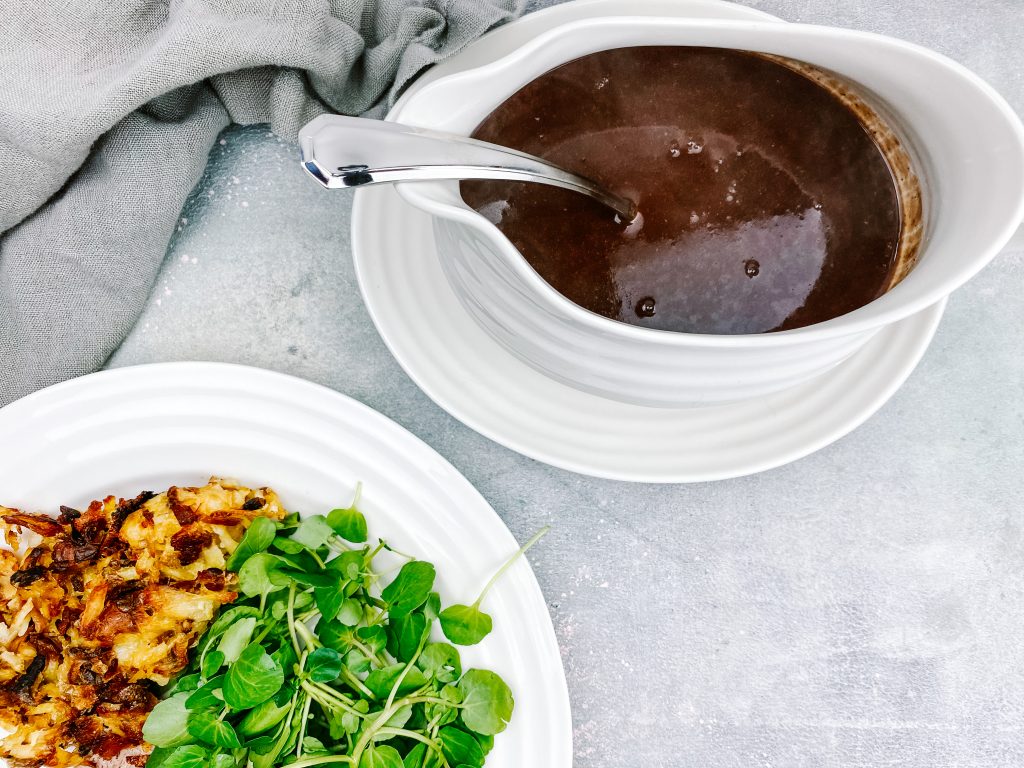
First, get the duck in the oven and cook:
- Pat the duck skin all over with some kitchen paper, to dry it as much as possible.
- Fill the cavity with the onion and thyme.
- Prick the duck with a skewer or tooth pick all over, particularly around the breast and legs. Ducks are very fatty and this allows the fat to escape. Try not to prick the meat.
- Rub the olive oil over the skin of the duck. You only need a small quantity – this just helps the skin to crisp.
- Season generously all over with the sea salt and pepper
- Cook in the centre of a preheated oven and set the timer for 30 minutes. After 30 minutes reduce the oven temperature.
- Remove from the oven 30 minutes before the end of cooking, baste and return to the oven. Try to use only the clear fat to baste rather than the dark gooey bits – you need these for the gravy.
- Take out of the oven after the final 30 minutes and transfer to a heated bowl/plate or a chopping board.
- Save all the tasty bits on the base of the baking dish to make the gravy.
- Leave to rest for 15 minutes. I love the crispy skin so I do not cover with foil – if you cover with foil, the duck will sweat and loose its crispiness. It will keep warm enough for up to 30 minutes, at least.
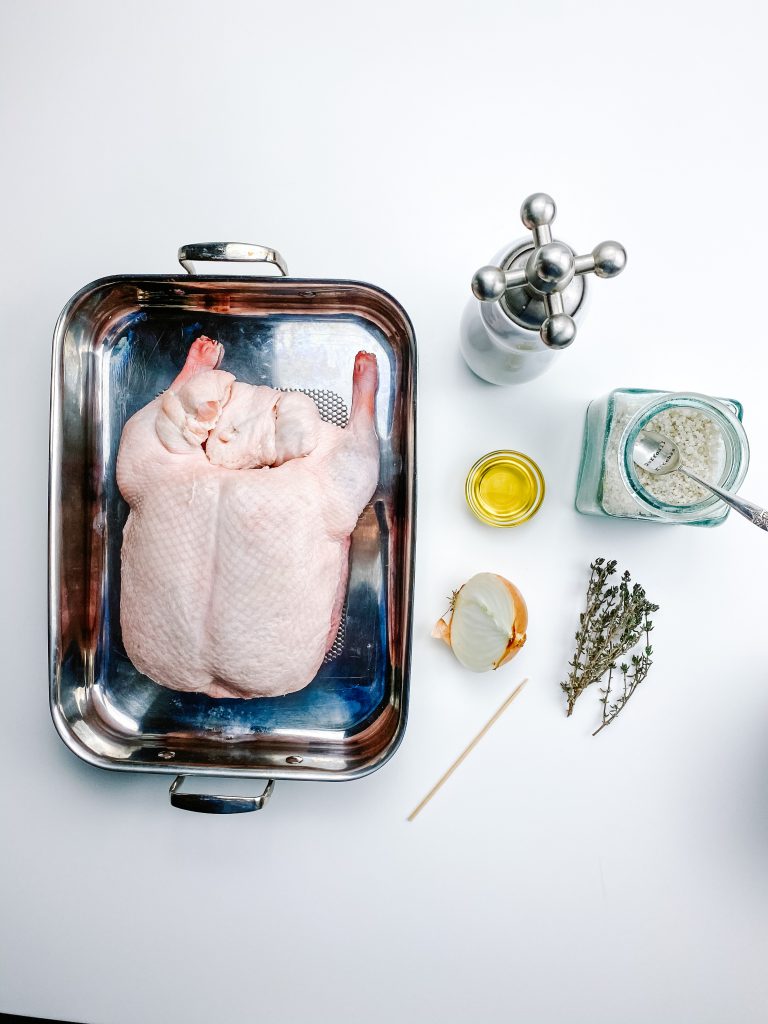
Ingredients 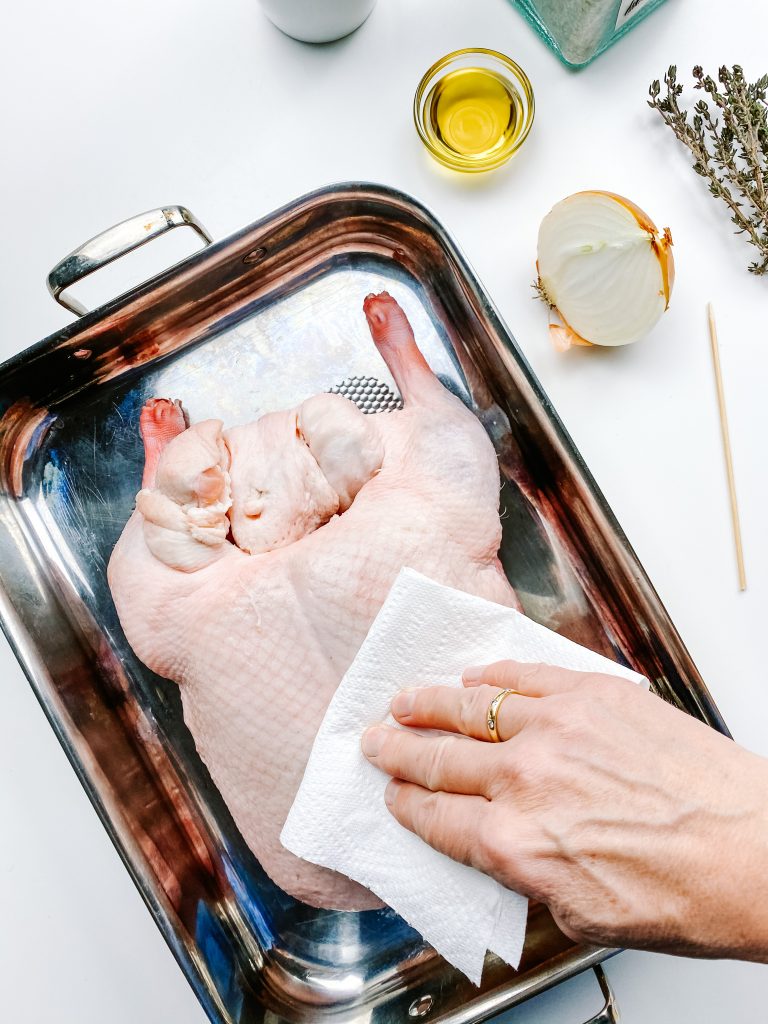
1 Dry duck skin with kitchen paper 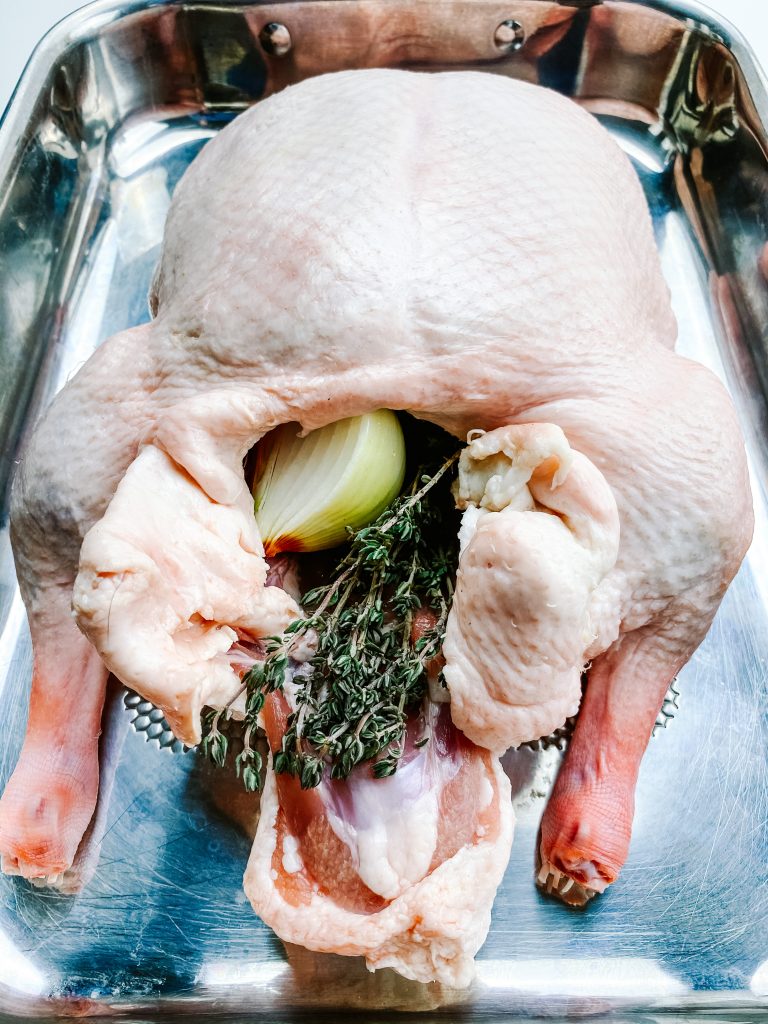
2 Fill cavity with onion and thyme 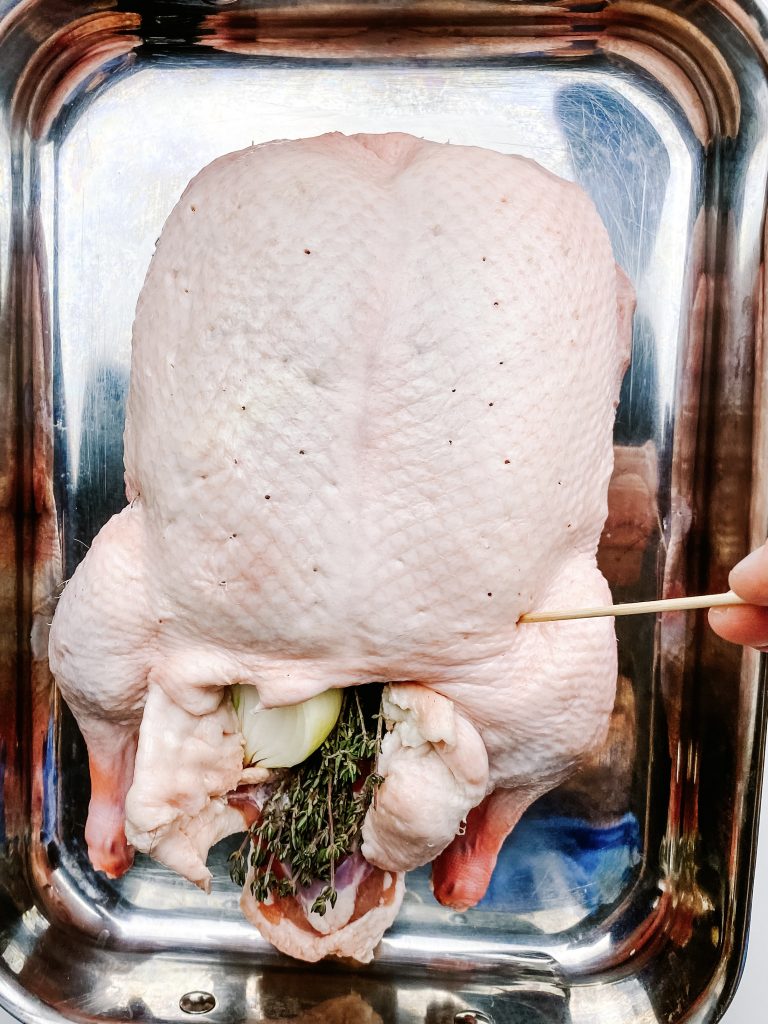
3 Prick all over 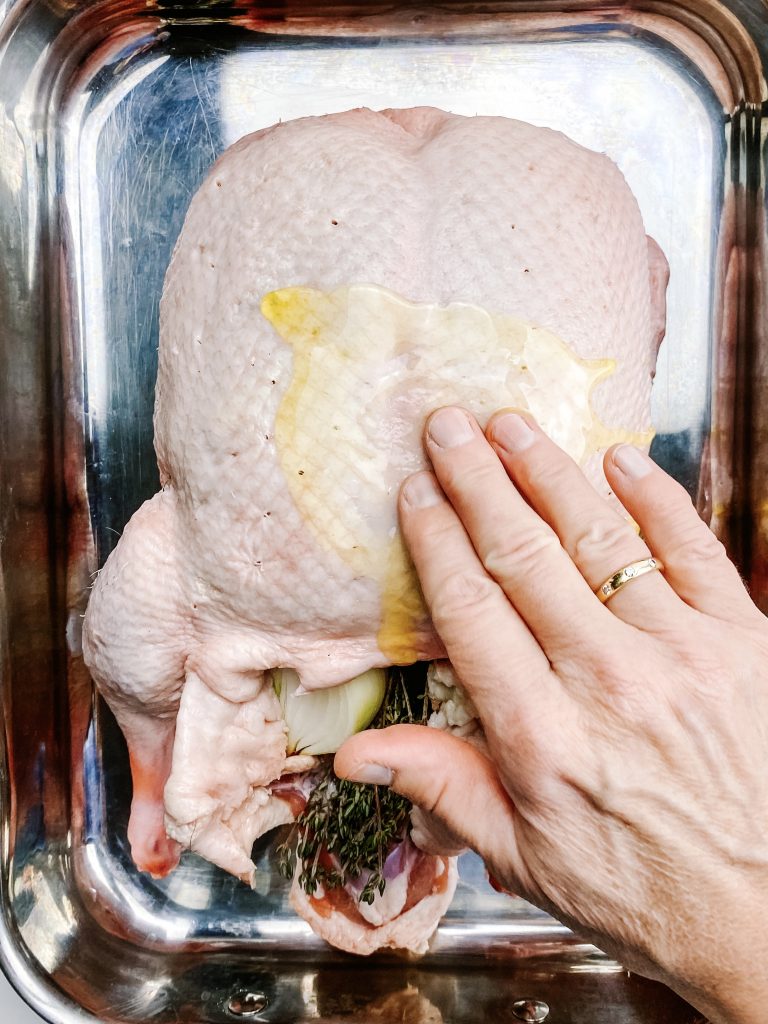
4 Rub with oil 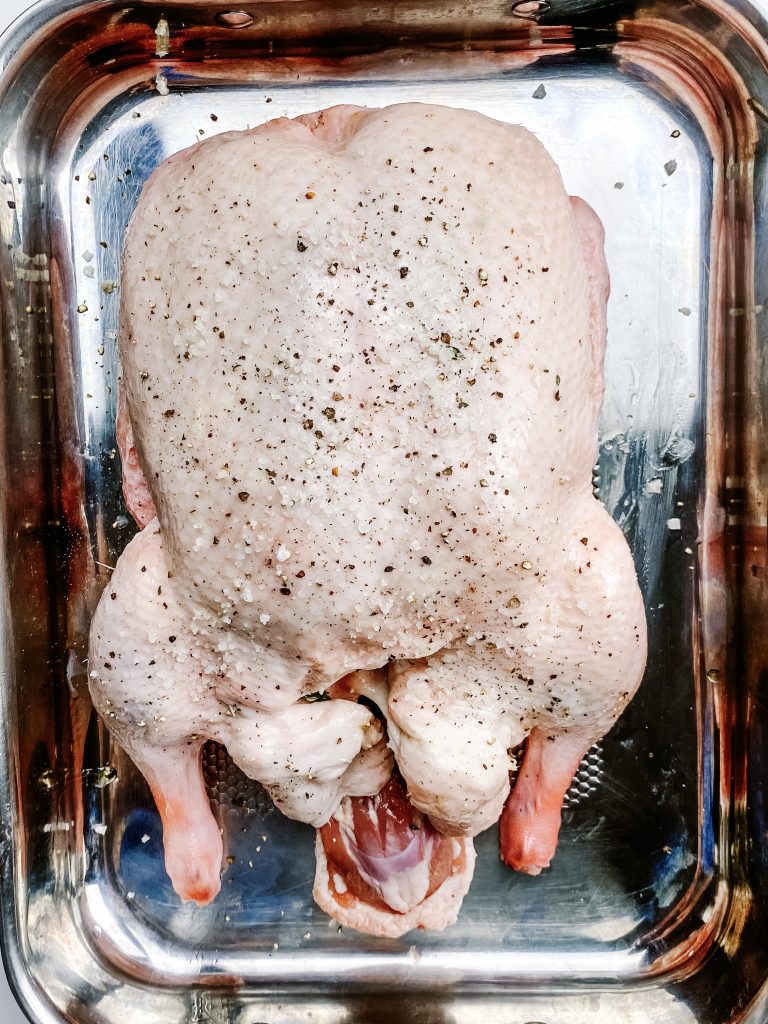
5 Season 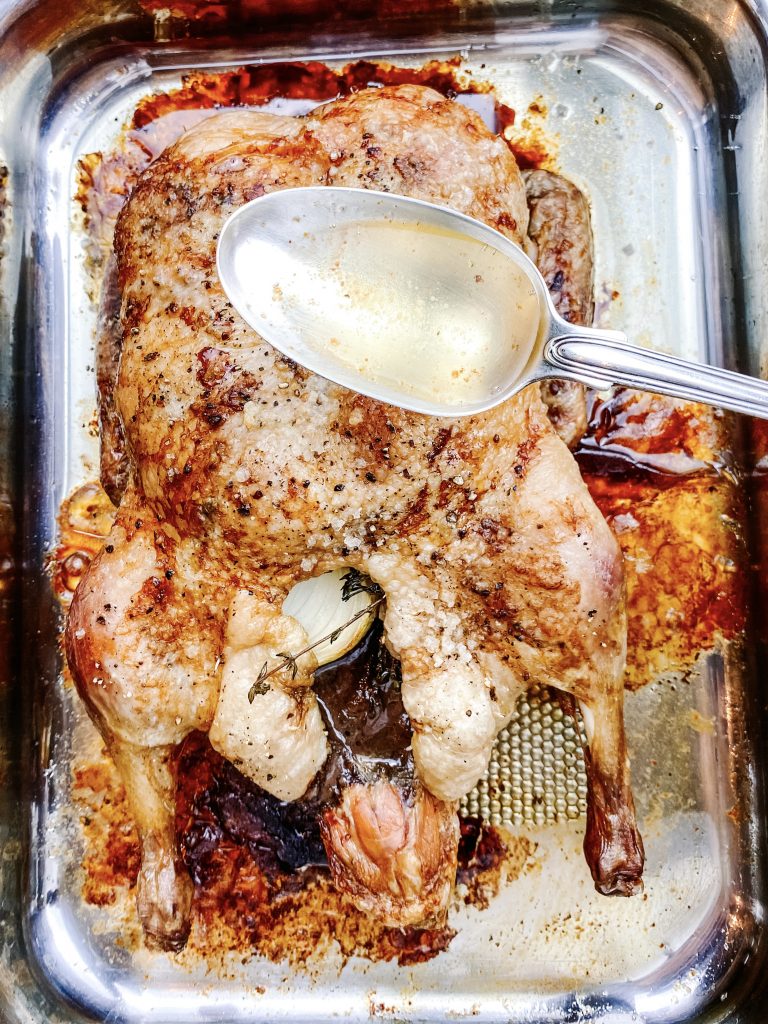
6&7 Cook and baste 30 mins before end of cooking 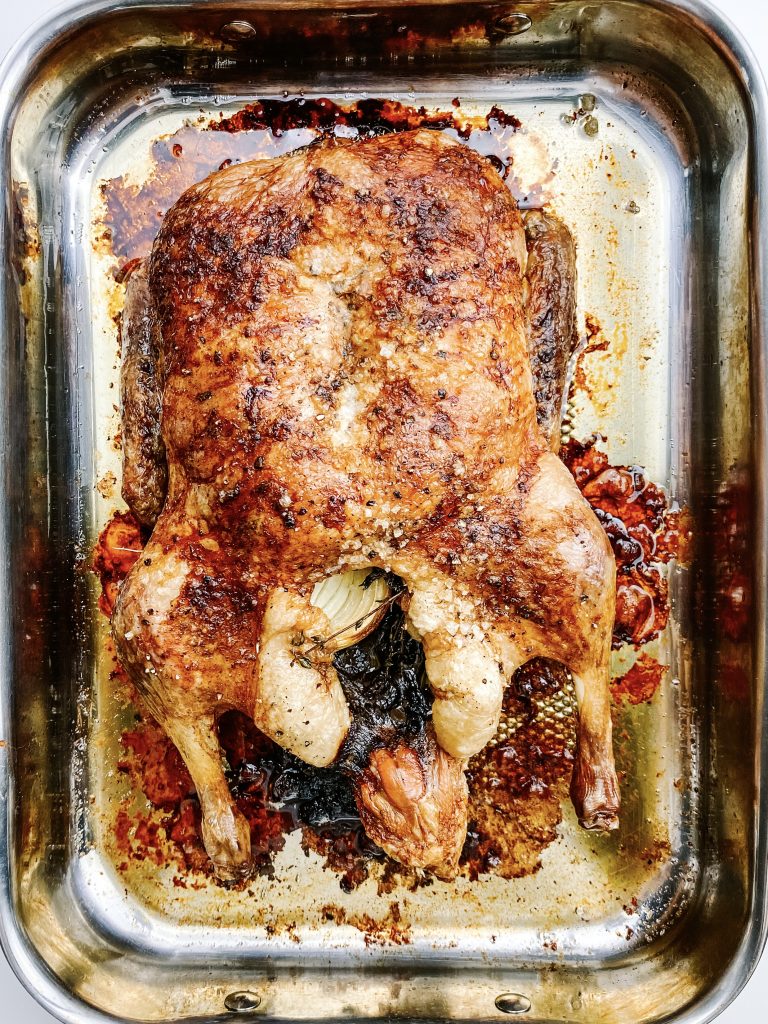
8 Remove from oven 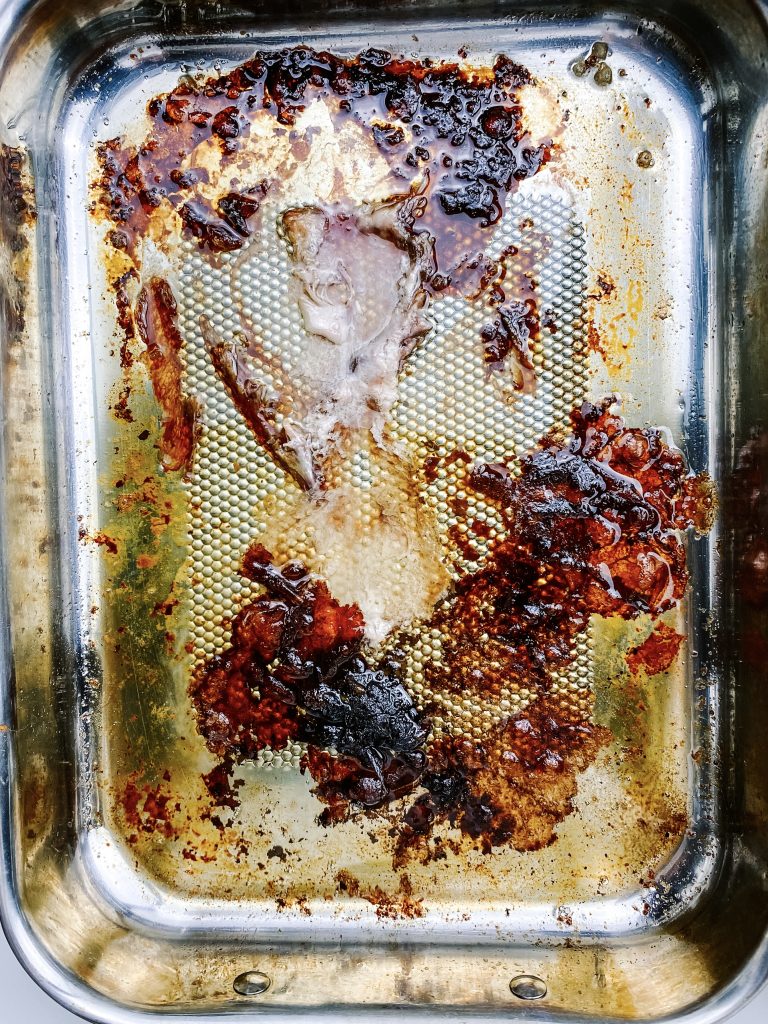
9 Tasty bits for gravy! 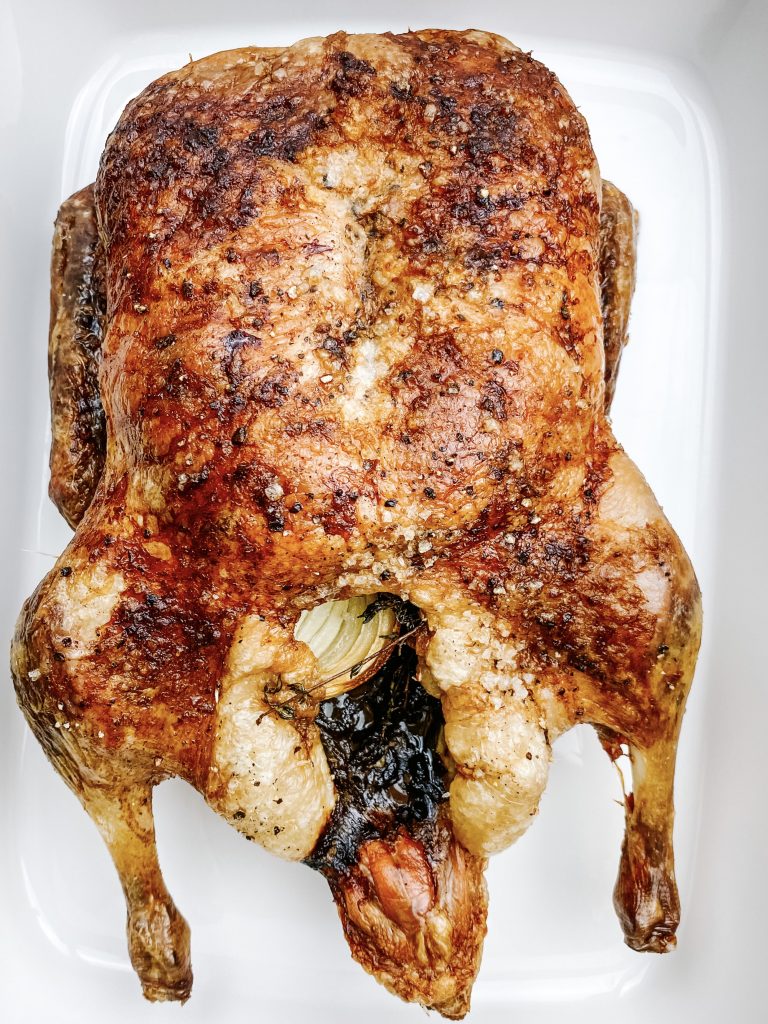
10 Rest for 15 minutes …. 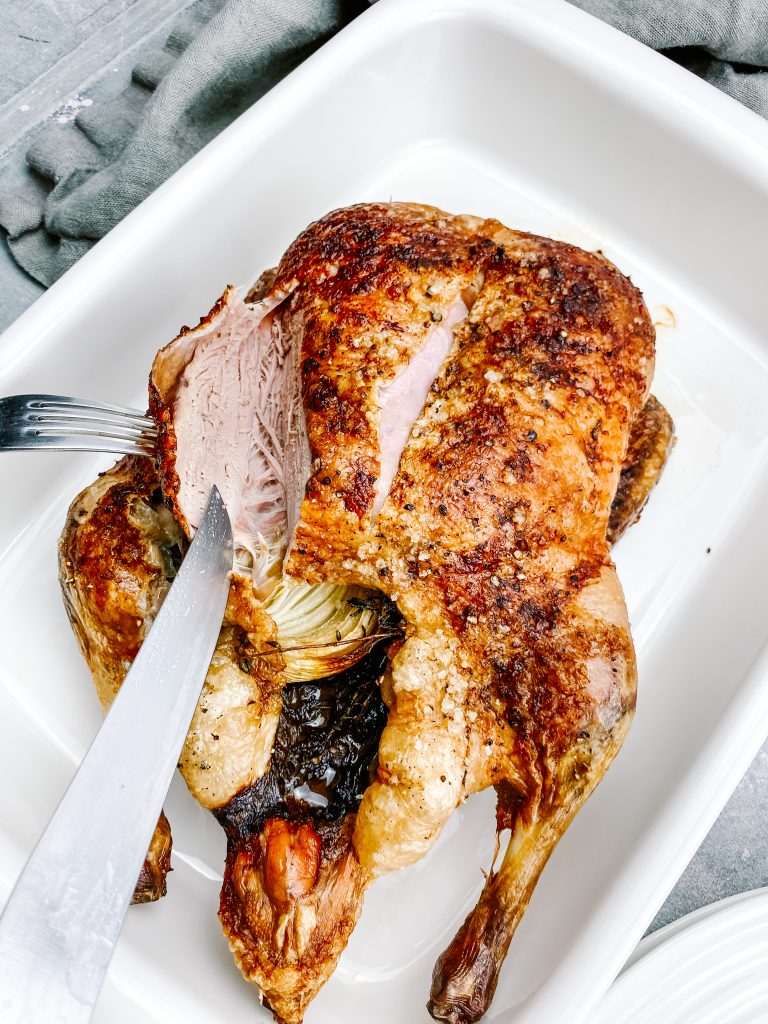
…. before carving.
Make the stock whilst the duck is in the oven:
If your duck did not come with giblets, use chicken or beef stock instead.
- Cover all the ingredients with water and bring to a gentle simmer.
- Remove the scum from the surface as the stock cooks
- Simmer gently for 1½ hours and then strain.
- You need 500ml stock. If you have too much, boil it and reduce. If you have too little, top up with cooking water from your vegetables, some stock or some plain water.
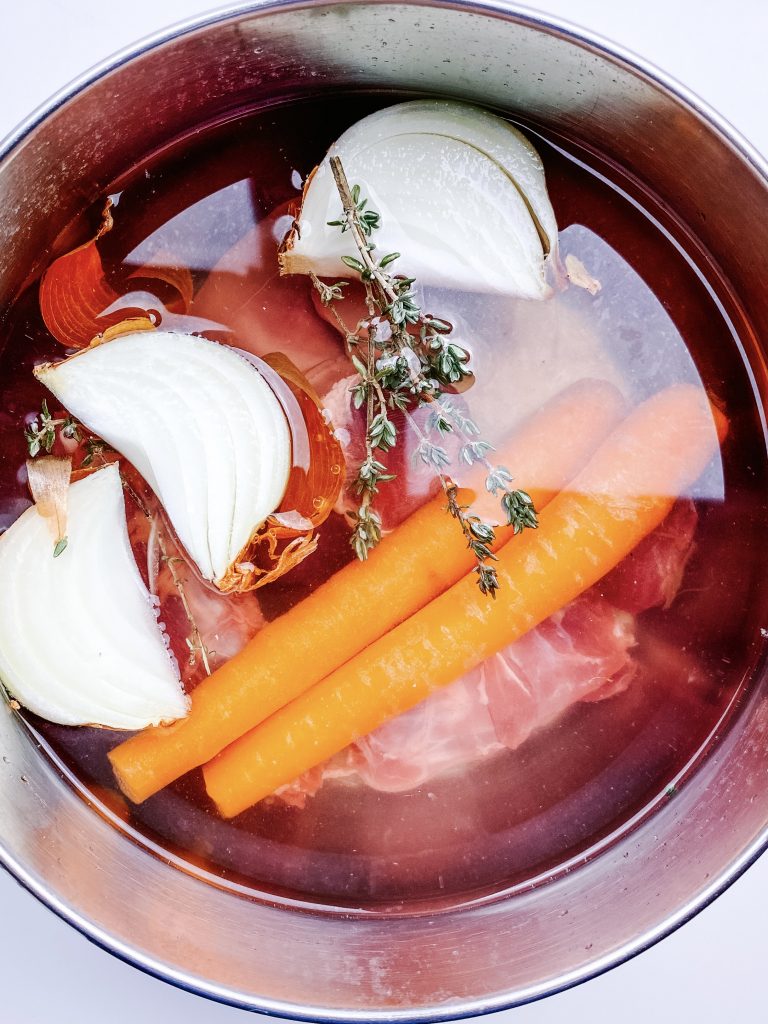
Stock ingredients 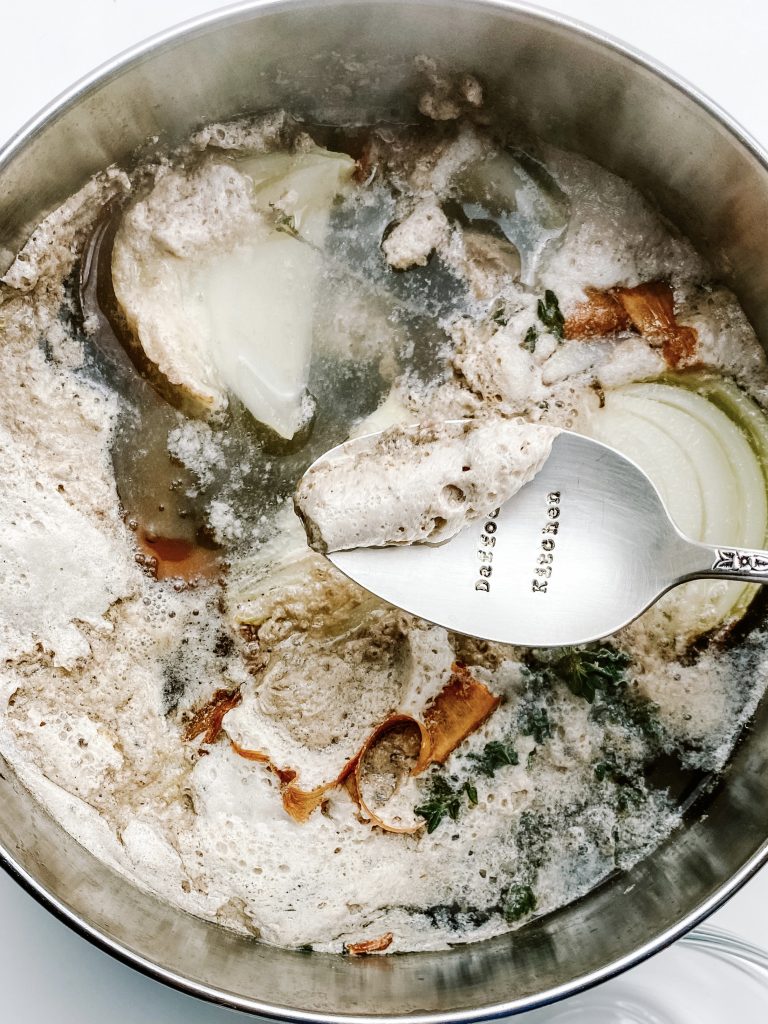
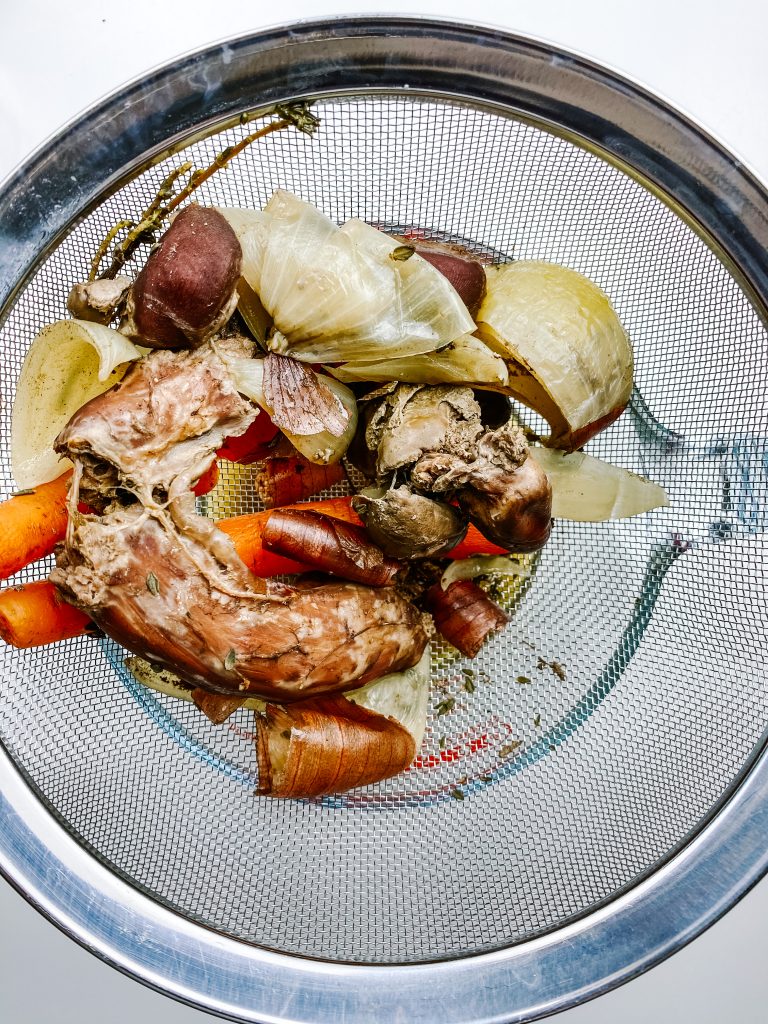
Make the gravy whilst the duck is resting:
- Prepare the vegetables:
- peel and roughly chop the onion
- wash, top and tail the carrots and slice – no need to peel
- peel and and smash the garlic cloves
- and thinly slice the ginger (no need to peel)
- Spoon most of the clear fat from the roasting tray/dish – leaving 2 tablespoons behind.
- Spoon it through a sieve into a jar. Save this and use it to make amazing roast potatoes.
- Heat the pan over a moderate heat and add the chopped onion, carrot, garlic, ginger, thyme and bay leaf. Cook for 5 minutes, stirring from time to time, until softened and slightly caramelised.
- Add the port and cook briskly to reduce by half and scrape up the sticky bits from the bottom of the pan.
- Stir in the flour and cook for 1 minute.
- Pour in the stock, redcurrant jelly and seasoning and cook stirring for 5 minutes until thickened and reduced by around ⅓.
- Strain the gravy through a sieve.
- Make sure you scrape out all the bits from the pan.
- Taste and adjust seasoning.
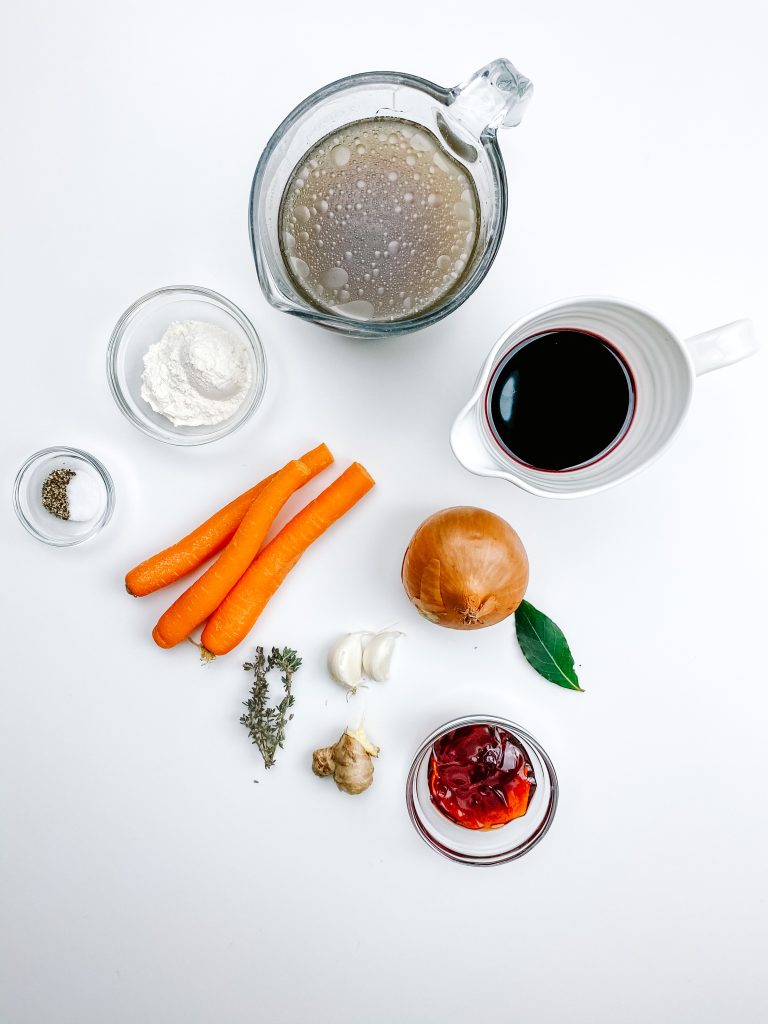
Gravy ingredients 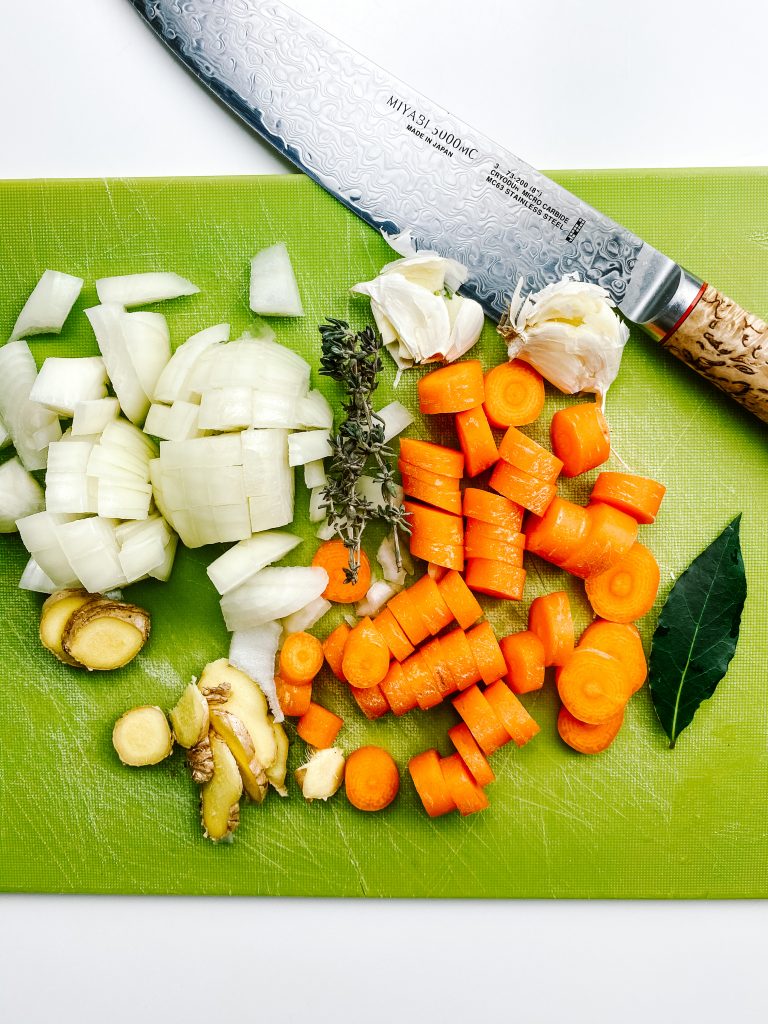
1. Chop the vegetables 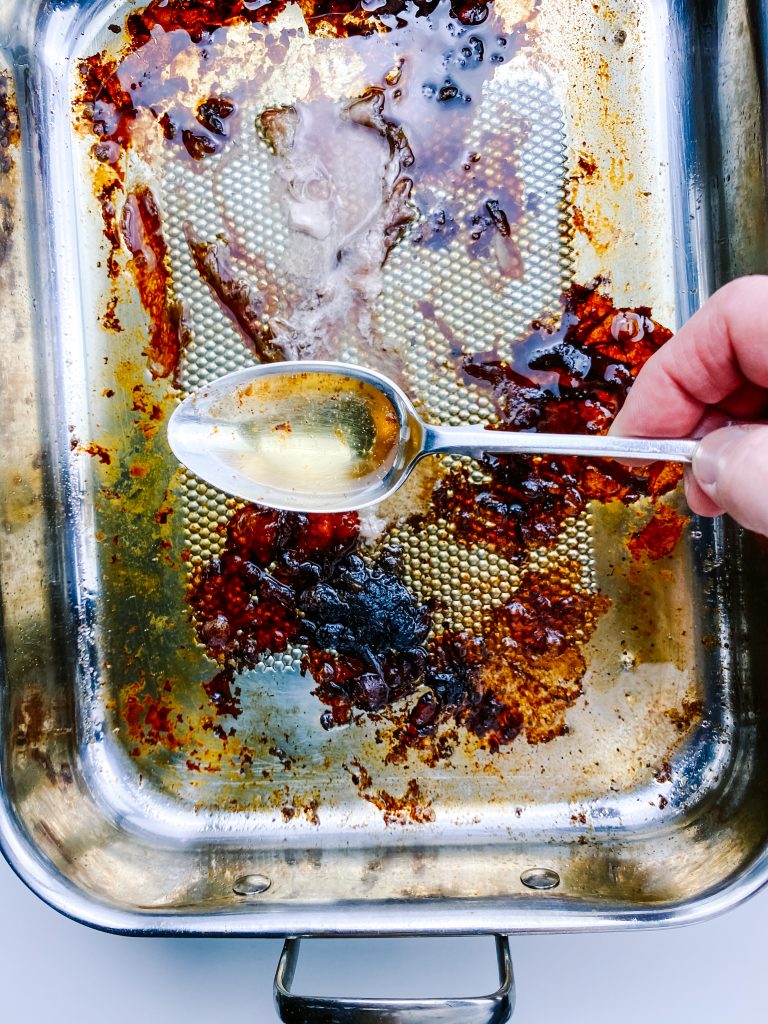
2 Remove fat 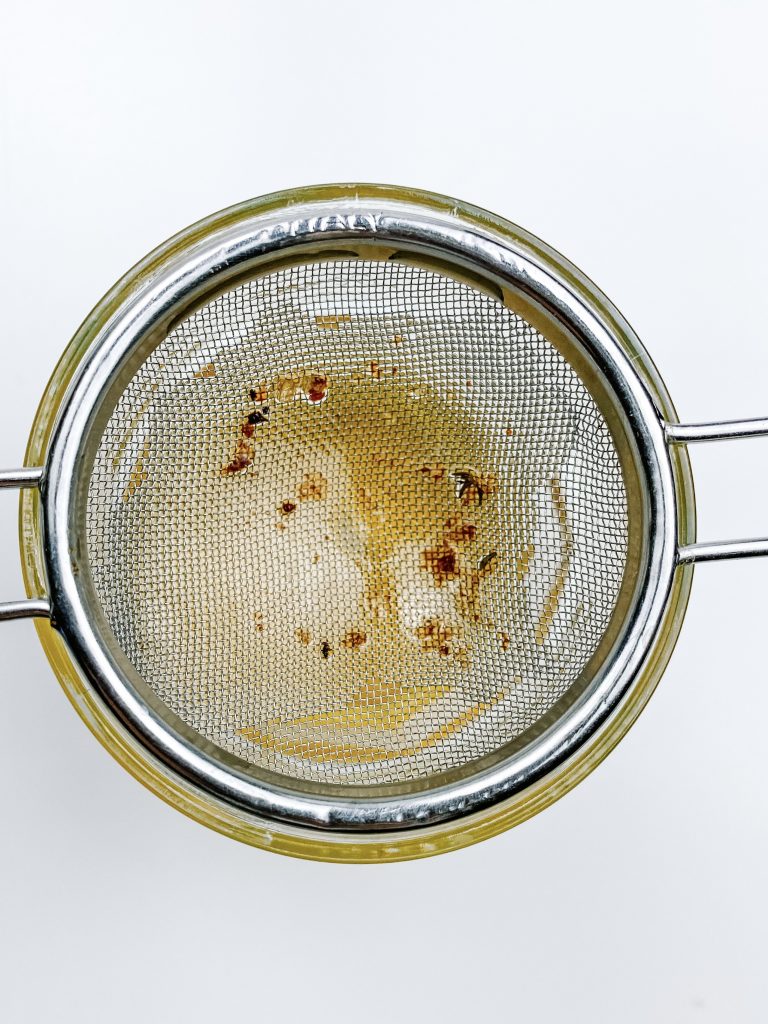
3 Sieve the fat into a jar… 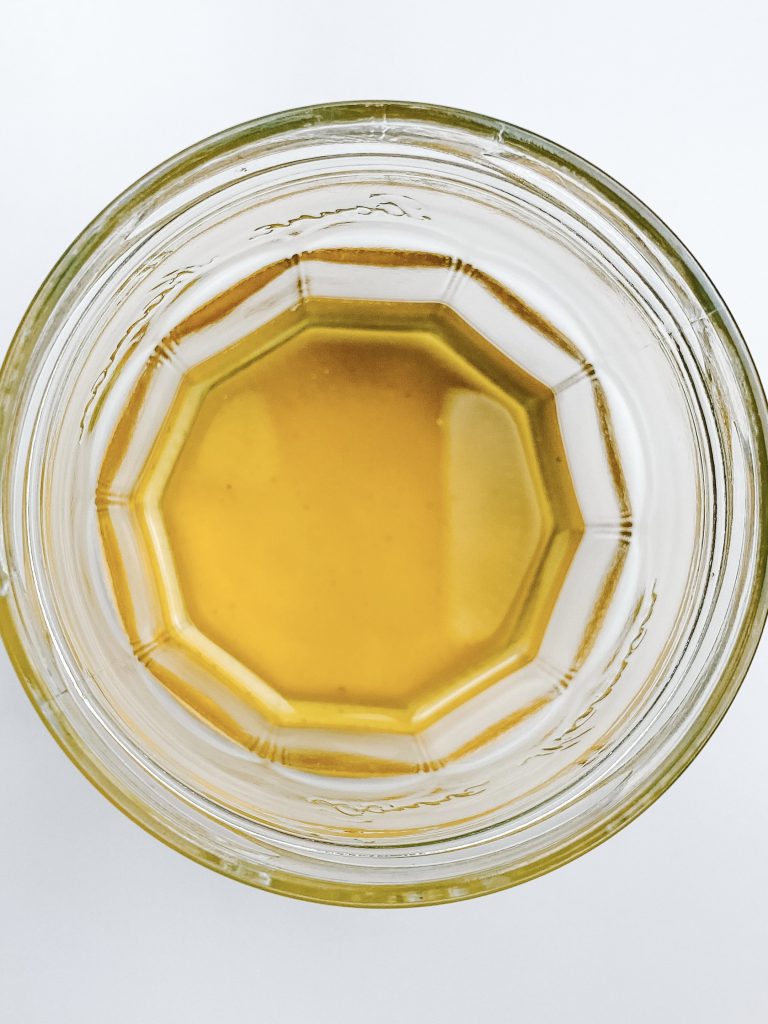
and save it for later use. 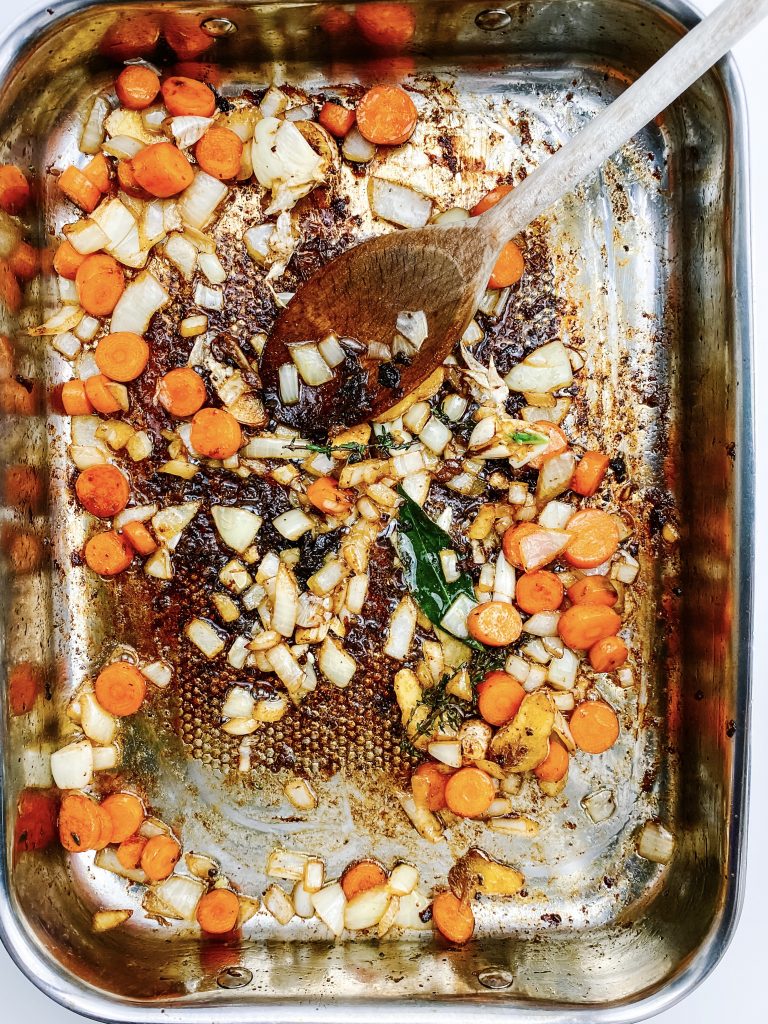
4 Cook for 5 minutes 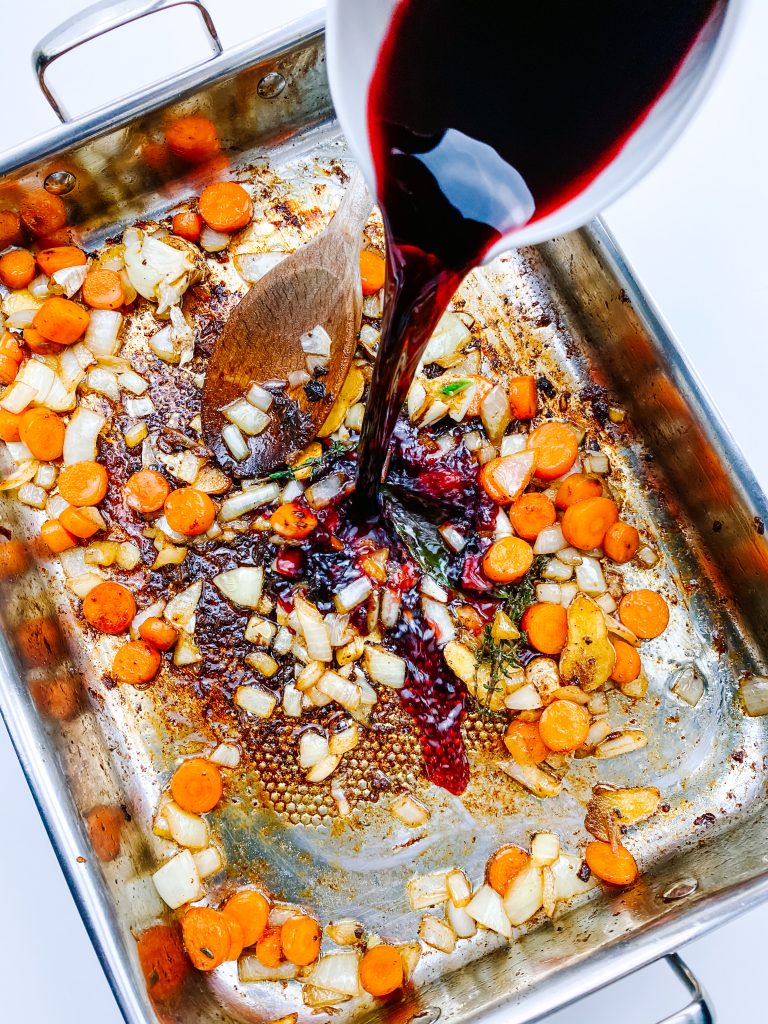
5 Cook, reduce and scrape up sticky bits 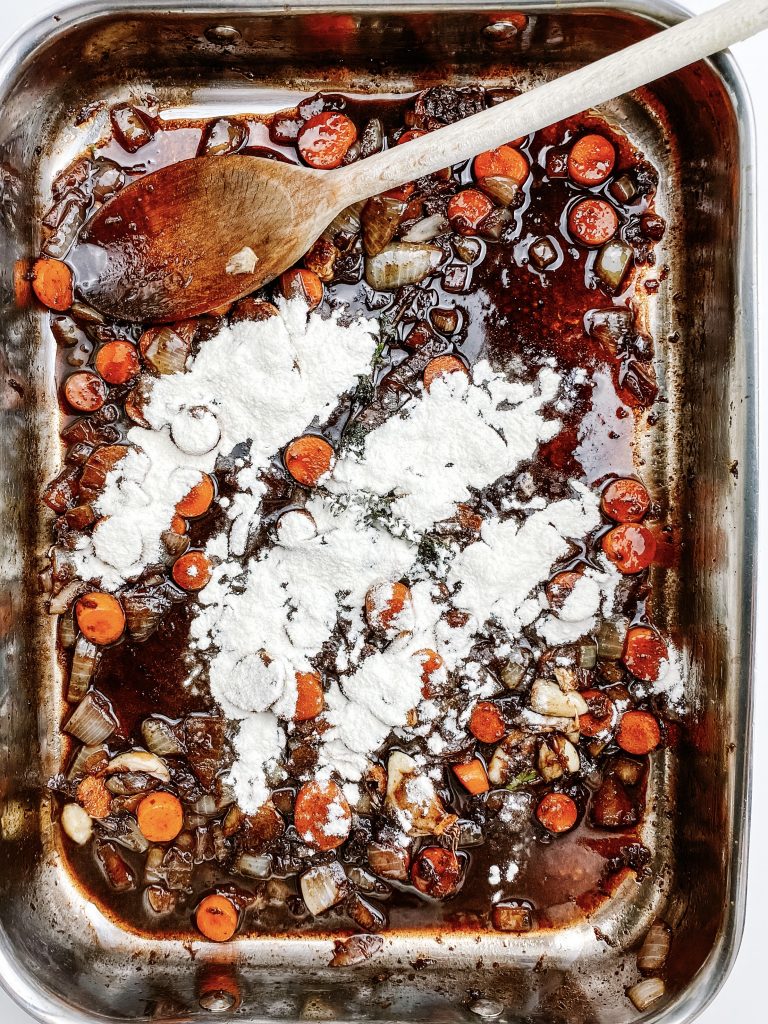
6 Add flour, and cook … 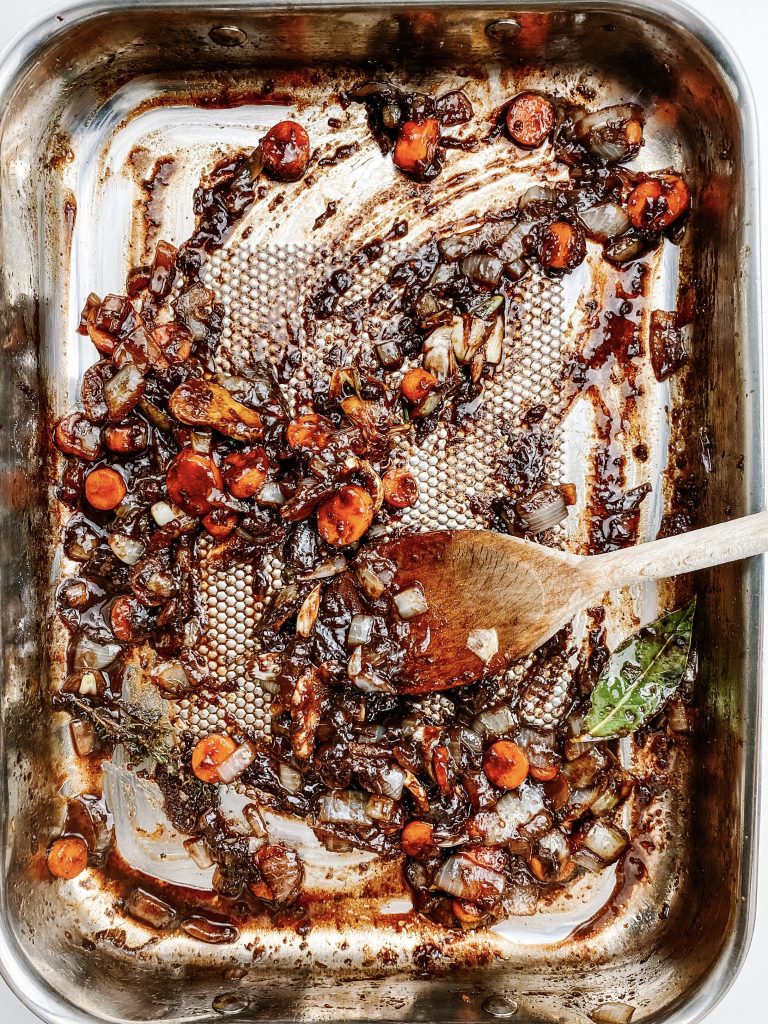
… stirring for 1 minute 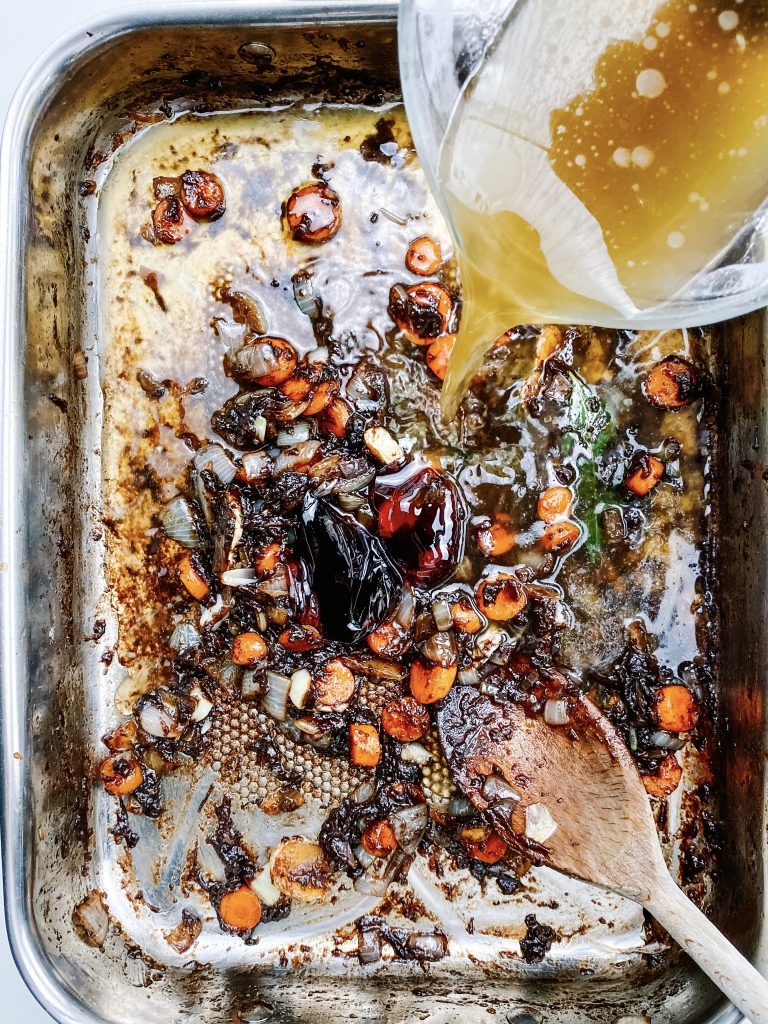
7 Pour in the stock, redcurrant jelly .. 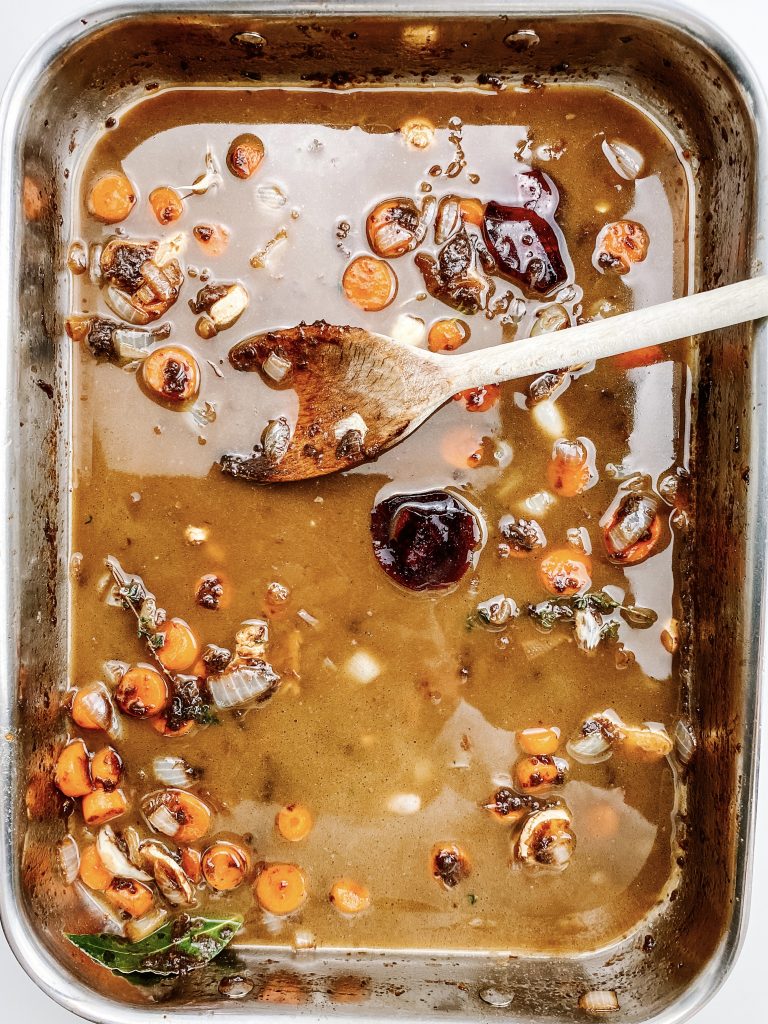
… and cook stirring for 5 minutes until thickened 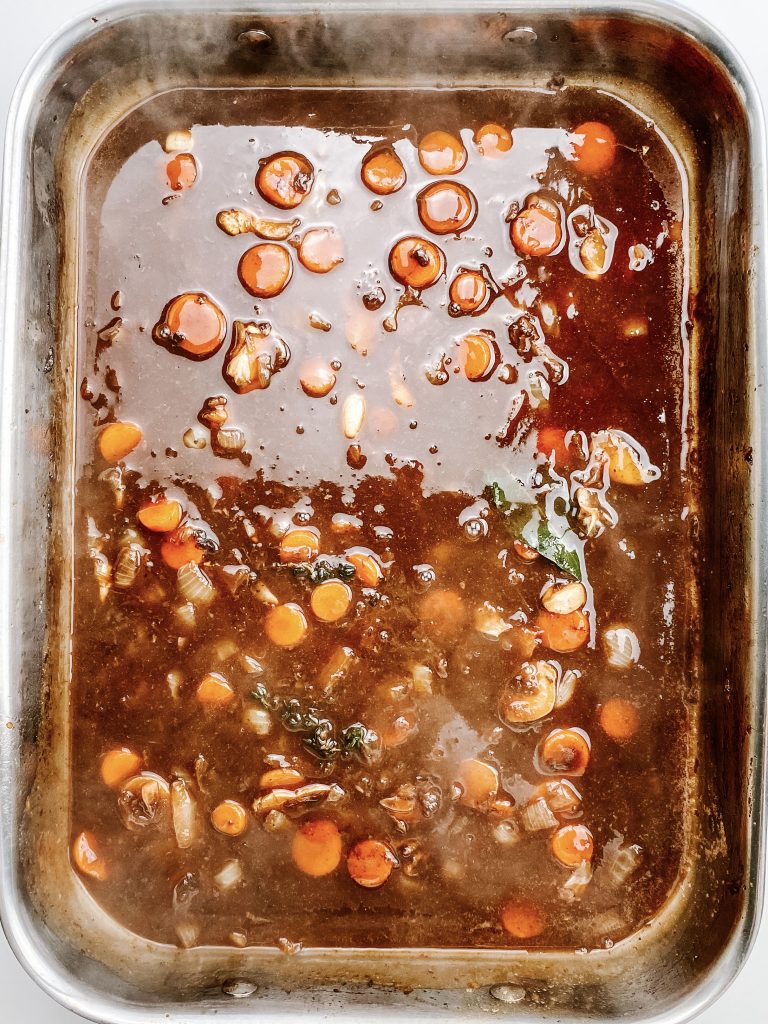
and reduced by around ⅓. 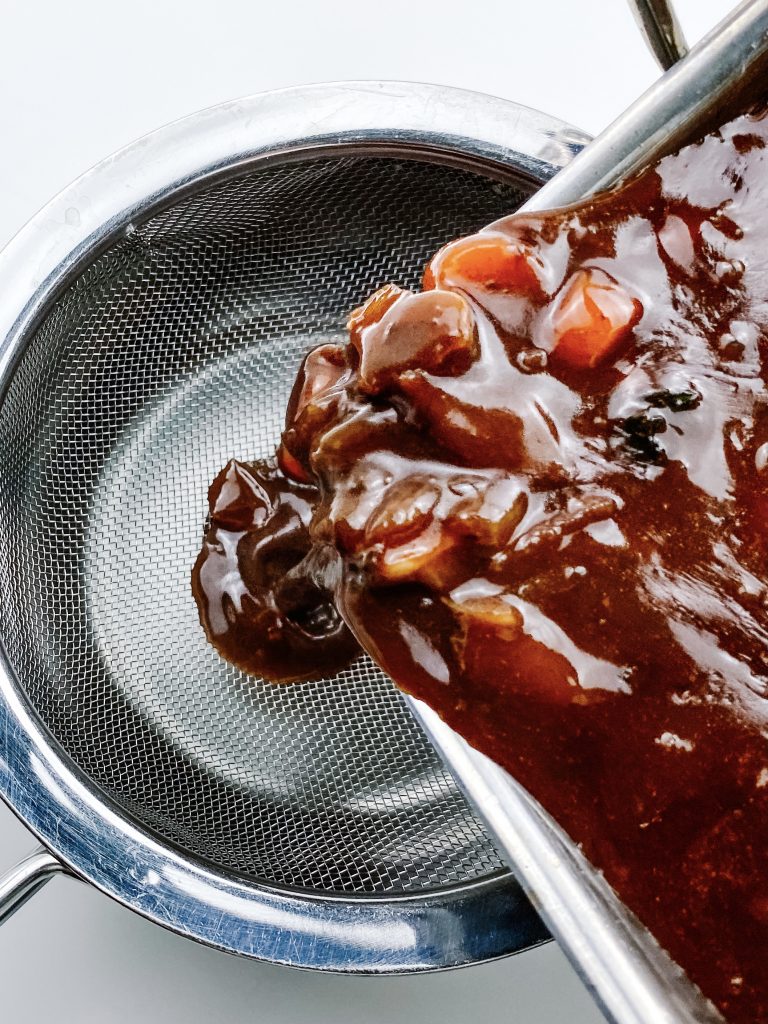
8 Strain the gravy 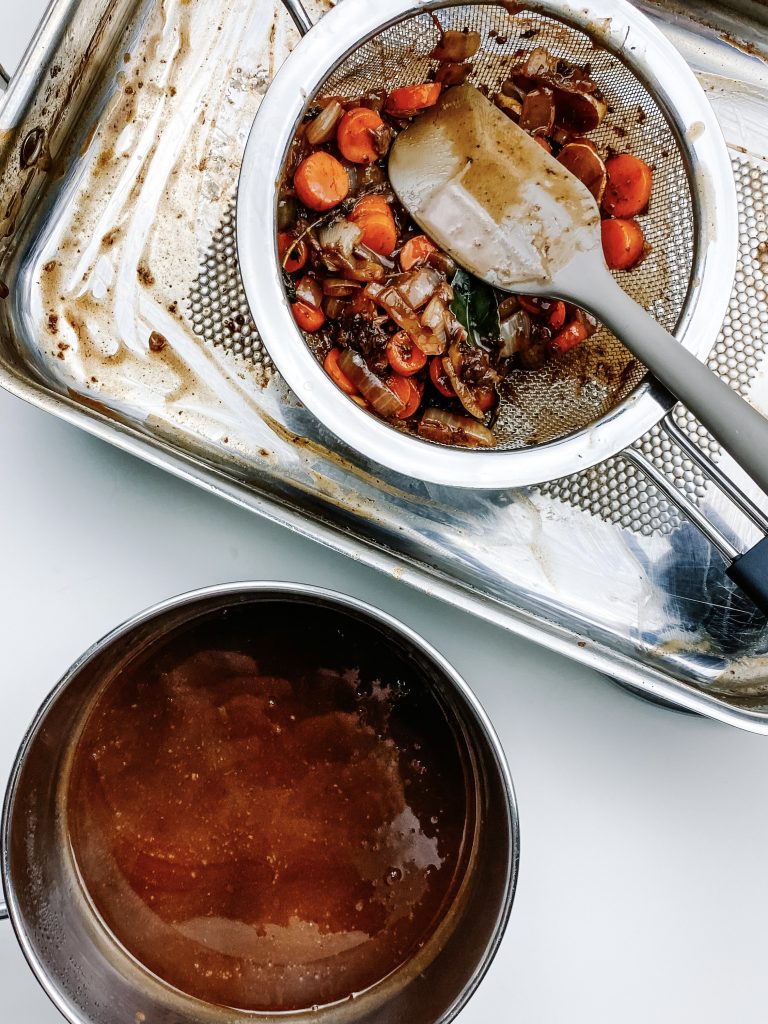
9 Scrape out all the bits 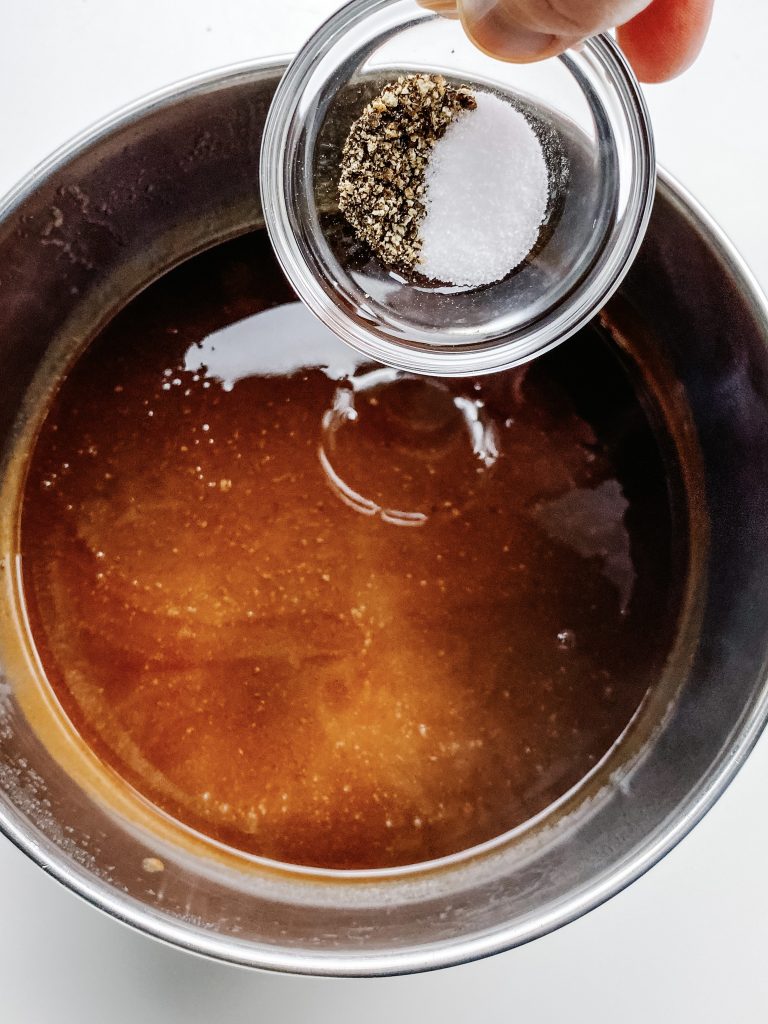
10 Taste, adjust seasoning.
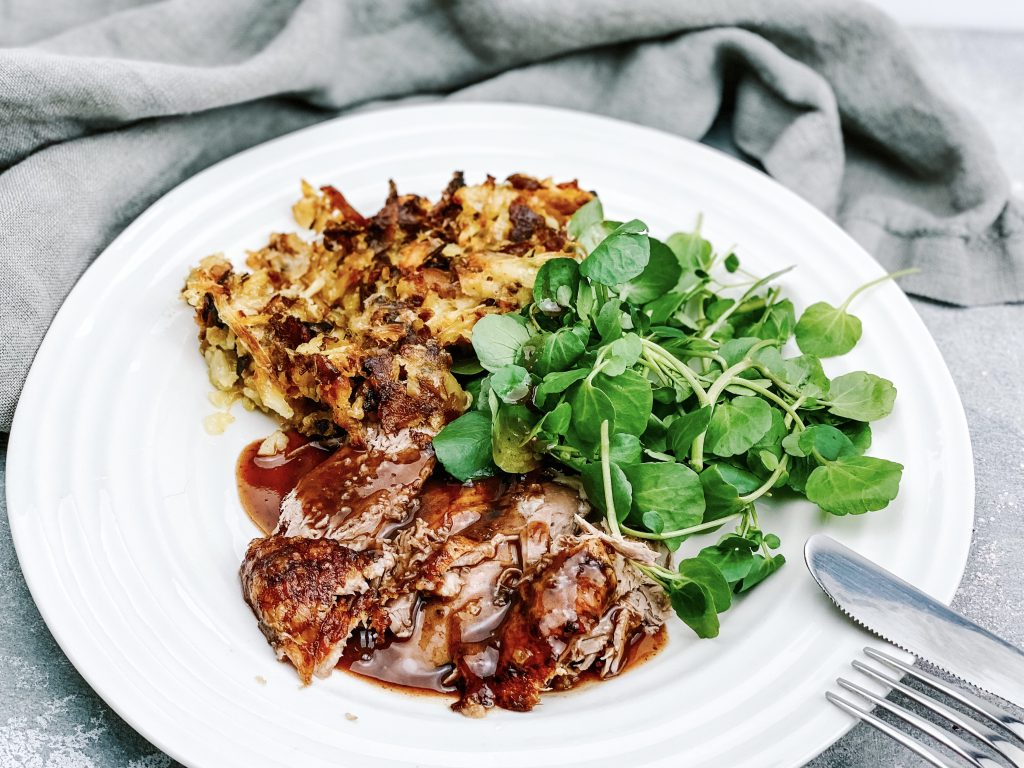
Made this recipe?
If you make this recipe, do please tag me on instagram @daffodil_kitchen. You could also leave a comment in the box directly below the recipe.
Whole Slow-Roast Duck with a Port, Ginger and Redcurrant Gravy
This recipe calls for slow roasting in the oven and then making a hugely flavourful, unctuous gravy from the pan juices, some reduced port, redcurrant jelly, ginger and a rich stock made from the giblets. Serves 3 – 4
Ingredients
Duck:
- 1 whole duck (Mine weighed 2.25kg)
- 1 teaspoon large grain sea salt
- ½ teaspoon freshly ground black pepper
- ½ medium onion, peeled and quartered
- 2 sprigs of thyme
- 1 teaspoon olive oil
Stock: (or use chicken or beef stock)
- duck giblets
- vegetables and herbs – such as onion, carrots, celery. I used ½ medium onion, 2 small carrots and some fresh thyme
- water
Gravy:
- 125g/1 medium onion, peeled and chopped
- 2 cloves of garlic, peeled and squashed with the back of a knife
- 100g/ 1 carrot, washed and roughly chopped
- 20g thinly sliced ginger – no need to peel
- 2 sprigs of thyme
- 1 bay leaf
- 200ml port
- 2 tablespoons plain/all-purpose flour
- 500ml duck (or chicken or beef stock)
- 2 tablespoons redcurrant jelly
- ¼ teaspoon plus ⅛ teaspoon salt
- ⅛ teaspoon freshly ground black pepper
Instructions
-
Collect together your equipment (see Recipe Notes below) and ingredients.
-
Calculate overall cooking and resting time for your duck. (See Recipe Notes)
-
Preheat oven to Fan Oven 180°C/200°C/400°F/Gas 6.
-
First, get the duck in the oven and cook: pat the duck skin all over with some kitchen paper, to dry it as much as possible.
-
Fill the cavity with the onion and thyme.
-
Prick the duck with a skewer or tooth pick all over, particularly around the breast and legs. Ducks are very fatty and this allows the fat to escape. Try not to prick the meat.
-
Rub the olive oil over the skin of the duck and season generously all over with the sea salt and pepper.
-
Cook in the centre of a preheated oven and set the timer for 30 minutes.
-
After 30 minutes reduce the oven to Fan Oven 150°C/170°C/325°F/Gas 3 and continue to cook.
-
Set the timer for 30 minutes before the duck should be cooked.
-
When the timer goes off, remove from the oven and baste. Try to use only the clear fat to baste rather than the dark gooey bits. Return to the oven.
-
Take out of the oven after the final 30 minutes and transfer to a heated bowl/plate or a chopping board.
-
Save all the tasty bits on the base of the baking dish to make the gravy.
-
Leave the duck to rest for 15 minutes, do not cover with foil. (See Recipe Notes)
-
Make the stock whilst the duck is in the oven: if your duck did not come with giblets, use chicken or beef stock instead.
-
Cover all the ingredients with water and bring to a gentle simmer.
-
Remove the scum from the surface as the stock cooks.
-
Simmer gently for 1½ hours and then strain.
-
You need 500ml stock. If you have too much, boil it and reduce. If you have too little, top up with cooking water from your vegetables, some stock or some plain water.
-
Make the gravy whilst the duck is resting: prepare the vegetables:
– peel and roughly chop the onion
– wash, top and tail the carrots and slice – no need to peel
– peel and and smash the garlic cloves
– and, thinly slice the ginger (no need to peel)
-
Spoon most of the clear fat from the roasting tray/dish – leaving 2 tablespoons behind.
-
Spoon it through a sieve into a jar. (Save this and use it to make amazing roast potatoes.)
-
Heat the pan over a moderate heat and add the chopped onion, carrot, garlic, ginger, thyme and bay leaf. Cook for 5 minutes, stirring from time to time, until softened and slightly caramelised.
-
Add the port and cook briskly to reduce by half and scrape up the sticky bits from the bottom of the pan.
-
Stir in the flour and cook for 1 minute.
-
Pour in the stock and redcurrant jelly and cook stirring for 5 minutes until thickened and reduced by around ⅓.
-
Strain the gravy through a sieve.
-
Make sure you scrape out all the bits from the pan.
-
Re-heat, taste and adjust seasoning.
-
To serve: I served my duck with some Swiss Rösti and some watercress but it is also delicious with Roast Potatoes, Gratin Dauphinois, simple, creamy mashed potatoes, some Hasselback Potatoes or even some Oven-Baked Fries.
Recipe Notes
Equipment:
- Roasting tray/dish
- Chopping board and knife
- Kitchen scales and measuring spoons
- Small bowl for the oil
Do not cover with foil:
I love the crispy skin so I do not cover with foil when I take it out of the oven and leave it to rest – if you cover it with foil, the duck will sweat and loose its crispiness. It will keep warm enough for up to 30 minutes, at least.
Cooking time:
The length of time a duck takes to cook will depend on both its size and also the temperature of the oven. This method is a slow method starting with a hot oven and then reducing the temperature for the most part:
- Preheat oven to Fan Oven 180°C/200°C/400°F/Gas 6. Cook at this temperature for the first 30 minutes
- Reduce to Fan Oven 150°C/170°C/325°F/Gas 3 for the remainder of the cooking.
- Work out your cooking time: this will be 30 minutes per 500g (or 10 mins per 165g) plus 30 minutes.
- For those working in imperial measures, 500g is 1.1 lbs and 165g is 5.8oz
- A 1.25kg duck –
- will take 30 minutes at the hotter temperature.
- plus, 1 hour and 15 minutes at the lower temperature – overall cooking time: 1 hour and 45 minutes.
- allow 15 minutes for the duck to rest.
- Total time – 2 hours.
- A 2.3kg duck –
- will take 30 minutes at the hotter temperature
- plus, 2 hours and 20 minutes at the lower temperature – overall cooking time: 2 hours and 50 minutes
- allow 15 minutes for the duck to rest.
- Total time – 3 hours and 05 minutes.
More from my site
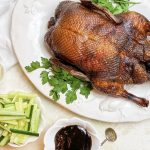 Chinese Peking Duck Pancakes with Hoisin Sauce, Spring Onions and Cucumber
Chinese Peking Duck Pancakes with Hoisin Sauce, Spring Onions and Cucumber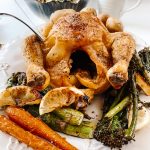 Skillet Roast Chicken with a Garlic and Thyme Jus
Skillet Roast Chicken with a Garlic and Thyme Jus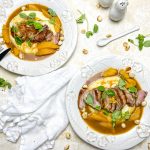 Duck à l’Orange, Celeriac and Potato Purée with Macadamia Nuts
Duck à l’Orange, Celeriac and Potato Purée with Macadamia Nuts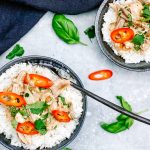 Thai Red Curry with Duck, Lychees, Sweet Basil and Coriander Served with Jasmine Rice
Thai Red Curry with Duck, Lychees, Sweet Basil and Coriander Served with Jasmine Rice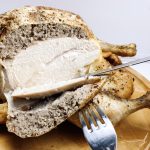 How I Roast Chicken for a Roast Chicken Dinner
How I Roast Chicken for a Roast Chicken Dinner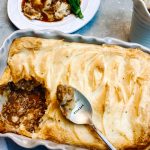 Shepherd’s Pie
Shepherd’s Pie

Lemon and Rosemary Drizzle Cake

Asian Fish Sauce
You May Also Like
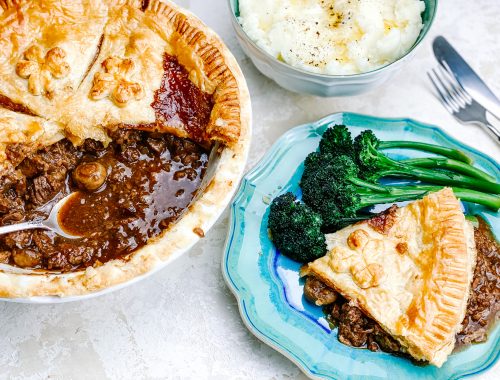
Beef and Guinness Pie with Mushrooms
10th March 2021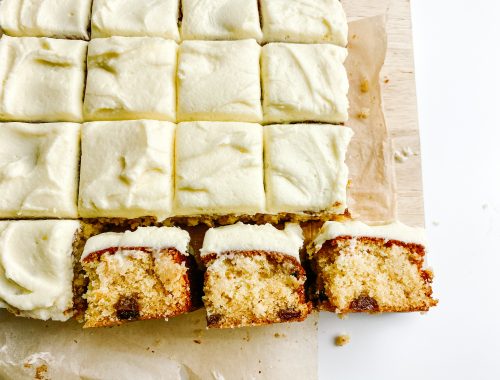
Light Lemon Fruitcake with Almonds and Vanilla Mascarpone Icing
7th January 2021